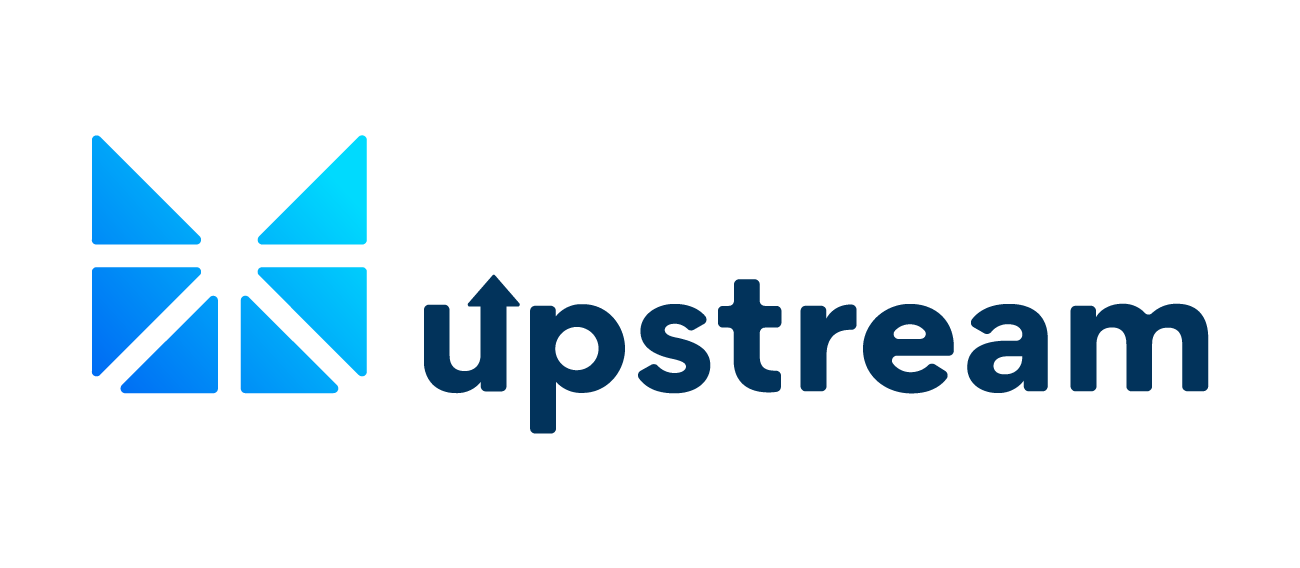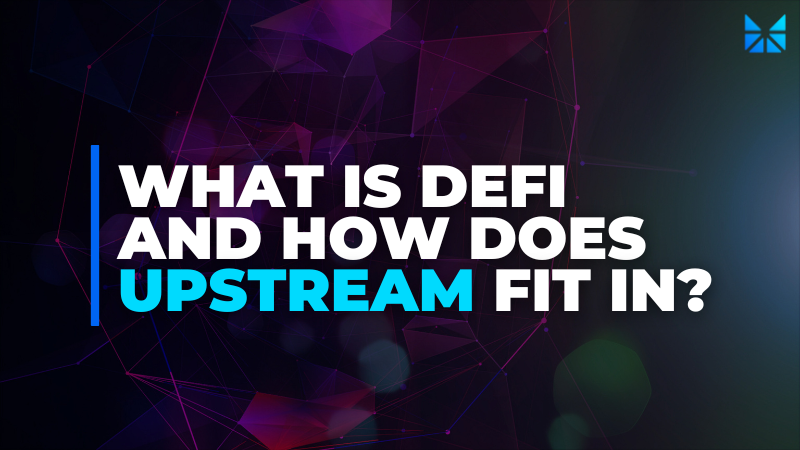An introduction to DeFi and how Upstream is making it more accessible with its blockchain-powered retail trading app

By Anastasia Samaras
Decentralized Finance (DeFi)
Decentralized Finance, or DeFi, falls deep within the crypto sector of fintech. It refers to digital assets, financial smart contracts, protocols, and applications (dApps) built on decentralized blockchains, most commonly Ethereum. DeFi is designed to be more transparent, accessible, and secure than the traditional financial system.
As a quick note, ‘decentralized’ refers to transactions that don’t rely on a central entity to complete the transaction. Instead, digital contracts are incorporated to take out some, if not all, of the middlemen and execute a transaction from person to person. ‘Non-custodial’ ties into this concept, and means that the investor or trader keeps hold of their assets and private keys instead of giving up control to a central entity to move assets on their behalf.
One of the key benefits of DeFi is that it can give people more control over their finances. When you use a DeFi dApp, you manage your assets and movement.
Another benefit of DeFi is that it is more transparent than the traditional financial system. Transactions recorded on a blockchain are public, so timestamps and movement are immutable to empower users.
DeFi is still in its early stages, but we believe it has the potential to revolutionize capital markets.
Decentralized Cryptocurrency Exchanges (DEXs)
DEXs are a type of DeFi dApp that allows people to trade cryptocurrencies without the need for a central authority. DEXs are typically more secure and transparent than centralized exchanges, and they offer a wider variety of trading pairs.
Interestingly, the majority of today’s DEXs are centralized despite decentralization being a core value of the blockchain community. However, DEXs can be more difficult to use than centralized exchanges, and they often have lower liquidity.
Decentralized Stock Exchanges
Decentralized stock exchanges (dSEs) are a new type of financial exchange that is built on top of blockchain technology. dSEs allow people to trade stocks without the need for a central authority.
dSEs promote a number of advantages over traditional stock exchanges like transparency, security, and efficiency.
However, dSEs are still in their early stages, and they have not yet achieved widespread adoption.
How the technology behind Upstream integrates the core values of DeFi
It’s important to note that Upstream is not a cryptocurrency exchange, Upstream, a MERJ Exchange market, is a securities market powered by blockchain technology.
Upstream is known for keeping intricate blockchain technology under the hood of our next-generation trading app to make NFTs and digital securities accessible to the masses.
With in-app wallet creation, biometrics to unlock private keys and sign transactions, and familiar funding methods like PayPal, debit, and credit, along with USDC stablecoin; Upstream is ushering in the future of NFTs and securities trading.
At Upstream’s core is Horizon’s sophisticated Ethereum-Layer 2 matching engine technology which comes with transparency, accessibility, and individual control over assets.
The majority of financial services are controlled by central parties today. Whether it’s trading, money transfers, asset purchases, etc., you typically must go through an intermediary.
When it comes to retail trading apps, retail trading orders are typically executed by a broker-dealer or designated market makers, “DMMs”. 0% trading fees are a fallacy because stockbrokers are paid by market makers for clients’ retail order flows, and market makers simply widen their bids/ask spreads to secretly cover this cost, meaning all retail trade prices suffer. Only market-making broker-dealers are allowed to make markets. Secretive stock lending of shareholders’ shares between broker-dealers can cause rampant short selling with huge lending fees paid, with mostly stockbrokers and market makers benefiting!
Blockchain-powered markets like Upstream have the ability to build and execute smart contracts courtesy of the Ethereum network. This enables peer-to-peer transactions, full asset control right from smartphones, and greater access to basic financing. At Upstream we are:
- Giving full control to the investor. Blockchain enthusiasts know the phrase “not your keys, not your coins.” This applies to the traditional securities market as well if you replace “coins” with “shares.” On Upstream, investors will control their securities from their smartphones. All transactions are biometrically verified and cryptographically signed using Ethereum, adding increased investor protection. We empower the investor to manage their securities as simply as they would manage their bank accounts and other payment applications. Trading apps that traditionally offer windows into exchanges, connecting to stockbrokers who sell retail order flow to market makers for exchange execution. Upstream removes stockbroker middlemen and market maker “members”, and a trader’s app is connected directly to the Upstream exchange.
- Decentralized, but with guardrails in place to protect investors. There are varying degrees of decentralization when it comes to DeFi services. Some die-hard crypto enthusiasts are all for complete decentralization, but if the assets you own can be robbed with impunity, what’s it all for? There simply are benefits to having protections in place that leverage traditional financial guardrails. For example, Upstream’s integrated KYC technology enables investors to verify who they are and have their securities returned to them if a private key is lost, stolen, or forgotten. In short, securities are controlled on a user’s smartphone wallet app and are protected by a user’s private key. The technology behind Upstream integrates with a regulated custodian engaged by the securities issuer so that a parallel record of all asset ownership can be maintained by a regulated entity. This way, in exceptional cases, assets can be lawfully restored to their rightful owner by the issuer’s custodian.
- Open finance. The majority of financial services are controlled by central parties today. Whether it’s money transfers, asset purchases, or lending, you typically must go through an intermediary. Ethereum-based financial services instead connect peer-to-peer and allow greater access to basic financing. While many DeFi projects can go over the general publics’ heads, Upstream is designed to look and feel like a traditional public marketplace with an intuitive interface. Upstream also features transparent pricing and market activity. We believe this works to create an honest and accessible marketplace while leveling the playing field for the everyday investor.
- Market makers are in charge. Retail trading orders may only be executed by a broker-dealer or DMM. Only market-making broker-dealers are allowed to make markets! Secretive stock lending of shareholders’ shares between broker-dealers causes rampant short selling with huge lending fees paid, with mostly stockbrokers and market makers benefiting! 0% trading fees are a fallacy because stockbrokers are paid by market makers for clients’ retail order flows, and market makers simply widen their bids/ask spreads to secretly cover this cost, meaning all retail trade prices suffer.
The Future of DeFi
The future of DeFi is bright. As the technology matures, DeFi is likely to become more user-friendly and accessible. This will lead to wider adoption of DeFi, and it could have a major impact on the traditional financial system.
Upstream is a layer-2 Ethereum platform and is proud to stick to Ethereum’s core values and decentralized nature without sacrificing investor protection and simplicity.
Learn more at https://upstream.exchange/ or reach the team at hello@upstream.exchange.
Disclaimers
This communication shall not constitute an offer to sell securities or the solicitation of an offer to buy securities in any jurisdiction where such offer or solicitation is not permitted.
NFTs have no royalties, equity ownership, or dividends. NFTs are for utility, collection, redemption, or display purposes only. Anyone may buy and sell NFTs on Upstream.
*U.S. or Canadian-based citizens or permanent residents may only deposit, buy, or sell securities on Upstream after being introduced by a licensed broker-dealer. Note that U.S. or Canadian-based investors include those U.S. or Canadian citizens who may be domiciled overseas. All orders for sale are non-solicited by Upstream and a user’s decision to trade securities must be based on their own investment judgement. Anyone may buy and sell NFTs on Upstream.
Upstream is a MERJ Exchange market. MERJ Exchange is a licensed Securities Exchange, an affiliate of the World Federation of Exchanges, a National Numbering Agency and member of ANNA. MERJ is regulated in the Seychelles by the Financial Services Authority Seychelles, https://fsaseychelles.sc/ an associate member of the International Association of Securities Commissions (IOSCO). MERJ supports global issuers of traditional and digital securities through the entire asset life cycle from issuance to trading, clearing, settlement, and registry. It operates a fair and transparent marketplace in line with international best practices and principles of operations of financial markets. Upstream does not endorse or recommend any public or private securities bought or sold on its app. Upstream does not offer investment advice or recommendations of any kind. All services offered by Upstream are intended for self-directed clients who make their own investment decisions without aid or assistance from Upstream. All customers are subject to the rules and regulations of their jurisdiction. By accessing the site or app, you agreed to be bound by its terms of use and privacy policy. Company and security listings on Upstream are only suitable for investors who are familiar with and willing to accept the high risk associated with speculative investments, often in early and development stage companies. There can be no assurance the valuation of any particular company’s securities is accurate or in agreement with the market or industry comparative valuations. Investors must be able to afford market volatility and afford the loss of their investment. Companies listed on Upstream are subject to significant ongoing corporate obligations including, but not limited to disclosure, filings, and notification requirements, as well as compliance with applicable quantitative and qualitative listing standards.
Forward-Looking Statements
This communication contains “forward-looking statements.” Such statements may be preceded by the words “intends,” “may,” “will,” “plans,” “expects,” “anticipates,” “projects,” “predicts,” “estimates,” “aims,” “believes,” “hopes,” “potential,” or similar words. Forward-looking statements are not guarantees of future performance, are based on certain assumptions, and are subject to various known and unknown risks and uncertainties, many of which are beyond the Company’s control, and cannot be predicted or quantified, and, consequently, actual results may differ materially from those expressed or implied by such forward-looking statements. Such risks and uncertainties include, without limitation, risks and uncertainties associated with (i) difficulties in obtaining financing on commercially reasonable terms; (ii) changes in the size and nature of our competition; (iii) loss of one or more key executives or brand ambassadors; and (iv) changes in legal or regulatory requirements in the markets in which we operate. The Company assumes no obligation to publicly update or revise its forward-looking statements as a result of new information, future events or otherwise.

